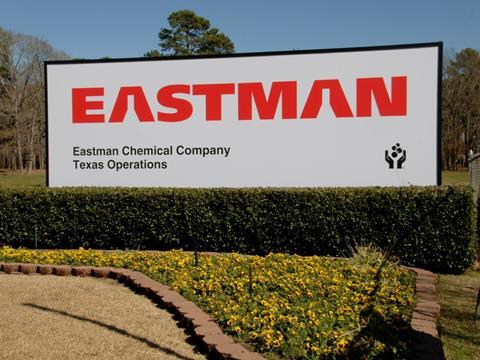
Eastman’s second U.S. molecular recycling project, chosen in the pursuit of low-carbon intensity rPET, has been selected by the Department of Energy (DOE) to begin award negotiations for an investment of up to $375 million.
The Bipartisan Infrastructure Law and Inflation Reduction Act funding is part of the Industrial Demonstrations Program (IDP). Eastman plans to build the second facility at its location in Longview, Texas, which apparently provides enough space for onsite renewable energy.
The company states it was selected by the DOE to accelerate the demonstration of industry-leading low-carbon intensity recycled PET with this project. Reaching a collaborative agreement with the DOE means the project can be expanded to include the deployment of thermal heat batteries and onsite solar power.
Combined with Eastman’s methanolysis technology, this reportedly achieves a step-change improvement in decarbonizing PET production, resulting in recycled PET with carbon emissions reduced by over 70% compared to fossil virgin production, and reduced by approximately 90% when including avoided emissions.
The investment includes operations preparing mixed plastic waste for processing, Eastman’s molecular recycling unit to depolymerize waste, and a polymer facility to create virgin-quality materials for packaging and textiles. The company says the facility will have the capacity to recycle approximately 110,000 metric tonnes of hard-to-recycle plastic waste.
Eastman’s polyester renewal technology recycles hard-to-recycle plastic waste bound for landfill or incineration. The company’s technology allows this waste to be broken down into its molecular building blocks and reassembled to become virgin-quality material. The company aims to enable the potentially infinite use of materials by keeping these valuable molecules in production, in a material-to-material high-yield loop. Eastman says it can transform waste plastic into virgin quality food contact polyesters with lower greenhouse gas emissions than traditional methods.
In 2023, a new line of reuseable bottles from Eastman Tritan Renew - constituting 50% ISCC-certified recycled content sourced from a molecular recycling technology – was launched by air up. The air up Generation 2 bottles are reportedly manufactured with 100% renewable energy within the European Union.
Amazon worked with the US DOE’s BOTTLE Consortium last year to develop a new recovery and recycling process for mixed plastic waste streams while designing wayward materials to biodegrade in the environment.
If you liked this story, you might also enjoy:
Report: The ultimate guide to global plastic sustainability regulation
The Brief: Oxo-(bio)degradables: the who, what, and why of breaking down fossil-based plastics
Sustainable Packaging Summit: How Kraft-Heinz uses collaboration to drive innovation
The Brief: Using ocean-bound plastic in packaging – how, why and should we?













No comments yet